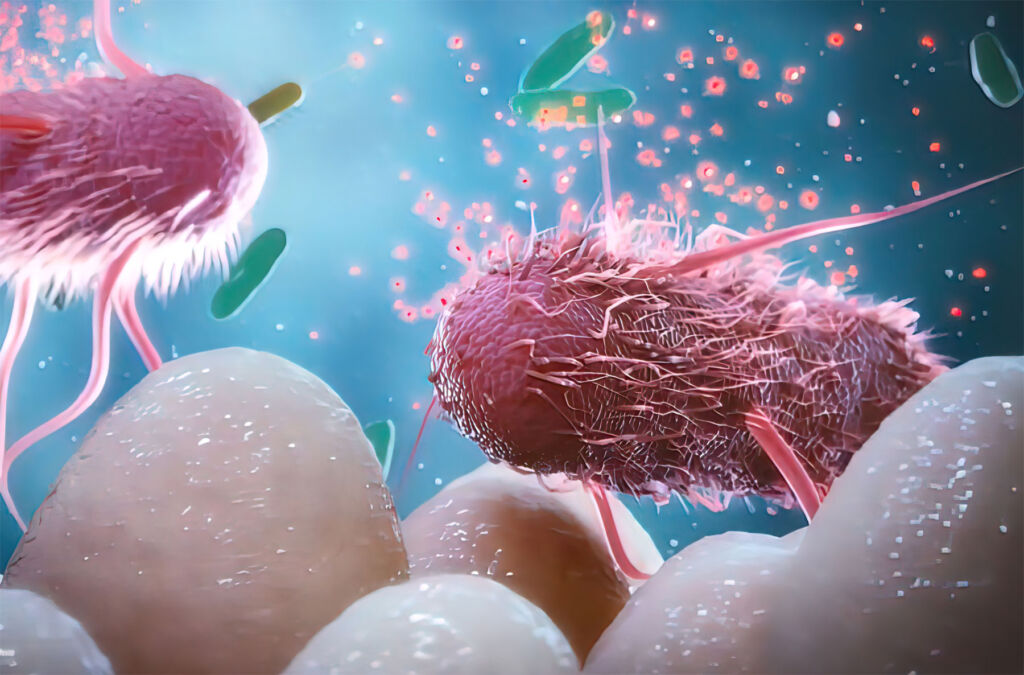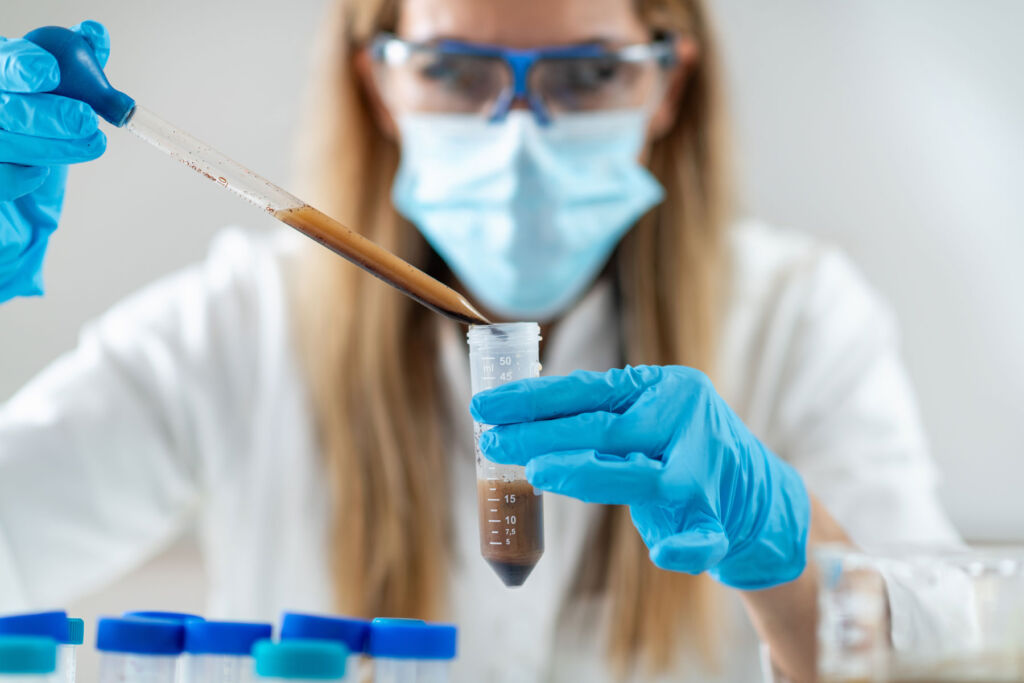
Have you ever had a ‘gut feeling’? Have you felt butterflies in your stomach? These are examples of your gut communicating with your brain. The human gut not only includes our own cells and tissues but also the many trillions of microorganisms that call our gut their home: the gut microbiota.
Recent research suggests that the health of this ecosystem can impact our physical health, our mental health, and also – potentially – our sleep.
What is the gut microbiome?
The gut microbiota is the name given to the trillions of microbes that live inside our gastrointestinal tract. An estimated 1-2 kg of microorganisms consider our intestines their home, a similar weight to the human brain! These are mainly bacteria but also fungi, parasites, viruses and protozoa.
The gut microbiome is the name given to these organisms and the genetic material they contain. Most organisms are found in the colon, which is the longest part of the large intestine.
A healthy human metabolism relies on a healthy functioning gut microbiome. The functions of the microbiome are incredibly varied and include the following:
- Protecting the integrity of the gut surface to prevent damaging substances from crossing into the bloodstream.
- Digestion and metabolism; for example, bacteria break down the carbohydrates we eat to produce short-chain fatty acids (SCFAs). One of these SCFAs, called butyrate, is particularly valuable for reducing inflammation and improving insulin sensitivity, which helps to control blood sugar.
- Maintenance of the immune system, in particular by mopping up excess inflammatory mediators and fighting infection.
- Production of vitamins and enzymes, including vitamin B12 and vitamin K. Folic acid, which helps our body make new cells like skin, hair and nails, is also made by the gut microbiome.
- Production of neurotransmitters; for example, the gut provides 90-95% of the body’s serotonin, which helps to regulate sleep, mood and digestion. Gut microbiota also aids the production of dopamine and tryptamine, which play a role in mood.
- Influencing the substances that cross the blood-brain barrier.
Although the microbiota includes organisms that can be potentially harmful, the ecosystem is carefully balanced so that the humans and their gut passengers are mutually compatible and beneficial – this is called ‘ symbiosis’.
However, a disruption in the balance of the number and type of microorganisms can be harmful to their human host; this is called ‘ dysbiosis’. A greater diversity in gut bacteria is thought to be protective against obesity, gastrointestinal disease, and some neurological diseases, including Alzheimer’s and some cancers.
How does gut health influence sleep, and vice versa?
Research into the links between our gut microbiome and sleep is in its infancy, and this is an area that scientists are actively researching.
There are strong indications that the diversity of the microbiome could have an influence on sleep, while our sleep-wake patterns also impact a variety of microorganisms in the gut.
For example:
- One study looked at sleep in 26 men using watches to track sleep patterns and found that higher microbiome diversity was associated with longer sleep duration and increased sleep efficiency (the proportion of time in bed asleep) (Smith 2019).
- Partial sleep deprivation in healthy adults can alter the gut microbiome in as little as 48 hours (Benedict 2016); however, not all studies report a link between sleep deprivation and microbial diversity (Zhang 2017).
- In mice, periods of low oxygen during sleep, which simulate what happens in sleep apnoea, have been shown to alter microbiome diversity (Moreno-Indias 2016). In humans, a 2022 study found that people with sleep apnoea have a different microbial community than people with normal sleep patterns (Ying Dong, 2022).
It may be that sleep is linked to specific types of bacteria. In one recent study in young children, a high concentration of Bifidobacterium was linked to longer sleep time, and Bacteroides was higher in children who had higher sleep efficiency (Wang 2022).
There are several different routes through which gut health could be linked to sleep.

1. The gut microbiome influences our circadian rhythms
The gut microbiota vary in size and function over a 24-hour period. In other words, they have their own circadian rhythm. This follows a timing pattern driven by their own genetic code but is also influenced by food intake and the biological clock and gender of their host (Zarrinpar 2014).
It is thought that our microbiota could help to support healthy circadian rhythms, the 24-hour patterns that keep our activity aligned with the light-dark cycle of the sun. If we get out of sync with the circadian rhythm of our microbiota – for example, by flying across time zones, this could result in GI upsets.
Recent studies have shown that sleep deprivation and subjecting mice to the equivalent of night shift work can change the structure and function of the intestinal microbiota in ways that slow the metabolism (Li 2018). This could be one of the reasons that shift workers are at greater risk of weight gain and metabolic disorders like diabetes.
One small study that subjected volunteers to sleep restriction and disrupted sleep-wake rhythms found that those with a greater microbial diversity were better able to maintain wakefulness (Sprecher 2019). This suggests that cultivating a healthy microbiome might be a useful protective strategy for shift workers.
2. The microbiome-gut-brain axis
The microbiome can influence brain activity, including mood and behavioural cues such as hunger. Bacteria can influence neural, hormonal and immune responses, as well as the permeability of the gut and the blood-brain barrier. Communication goes both ways – so the gut influences the brain, and vice versa.
There are strong links between sleep and mood, and it could be that the microbiota influences sleep via effects on anxiety or depression. Both anxiety and insomnia have been linked to a hyperactive stress response or a permanently elevated sympathetic or ‘fight or flight’ nervous system.

In animal studies, stress caused by social isolation has been shown to change the composition of microbiome bacteria and lead to anxiety-type behaviours. Interestingly, these behaviours were then reduced after a faecal transplant from non-stressed mice, suggesting that the microbiome had a causal impact on anxiety-type behaviours and that a healthy microbiome might increase stress resilience (Li 2018).
One recent study suggests that alterations to the microbiota could be an important pathway through which chronic sleep deprivation exerts negative effects on health. Sleep deprivation induced gut dysbiosis, inflammatory responses and cognitive impairment in humans, but in mice without a microbiota, there was a suppressed inflammatory response induced by sleep deprivation (Wang 2021).
How can you support your gut microbiome?
The gut environment is a bit like a garden – it needs nutrients to help the desirable flora flourish and to get rid of the undesirable ‘weeds’. Everyone’s gut garden is different, and what is normal for you may not be normal for someone else. Generally speaking, a high level of microbiota diversity is seen as a good thing.
The gut microbiome can also be supported by diets rich in prebiotics and probiotics. Probiotics contain live bacteria, whereas prebiotics are foods that contain fuel for bacteria to eat to promote increased levels of short-chain fatty acids.
A diet that is naturally high in fibre, fruits, vegetables and fermented foods (such as kimchee, kefir and sauerkraut) can increase the diversity of the microbiome and reduce inflammation. Dietary fibre can only be broken down and fermented by microbes living in the colon. This process releases short-chain fatty acids (SCFAs), which prohibit the growth of some harmful bacteria and reduce blood glucose levels.
Drinking alcohol, especially binge drinking, can disrupt the microbiota. Large fatty meals can also cause dysbiosis. Specific antibiotics can have positive or negative effects on the microbiome; with over 1,000 species of bacteria, the effects will depend on the drug, dose and duration.
An emerging area of science is the use of faecal transplants to treat and improve disorders directly linked to the GI tract, such as ulcerative colitis. Small-scale trials suggest that such transplants can have benefits for symptoms not directly related to the GI tract, such as cognition in patients with liver cirrhosis and seizures in patients with epilepsy, but it is not yet clear if this is an opportunity for sleep disorders (Smith 2019).
Could prebiotics, probiotics or other foods help with sleep problems?
There is evidence from animal studies that supplementing with probiotics could help to reduce anxiety or depression in the context of chronic stress (Burokas 2017).
A number of small studies suggest that probiotics and prebiotics may be useful strategies for restoring the dysbiosis caused by shift work (Lopez-Samarina, 2023). However, in humans, to date, there is currently not enough evidence to recommend prebiotics or probiotics for sleep.
One of the challenges is that everyone has a different microbiome, so the ‘right’ bacteria for one person may not be appropriate for another.
For now, evidence suggests that the best ways to improve sleep quality still consist of behaviours defined as ‘sleep hygiene’…
- Maintaining consistent sleep-wake patterns
- Getting exposure to natural daylight, especially in the morning
- Creating a consistent, relaxing bedtime routine
- Regular physical activity
Research into the microbiome also reinforces the importance of eating during daylight hours and avoiding large meals within 3 hours of going to bed, when the microbiome may be less suited to metabolism.
Read more health features and guides here.

![]()




You must be logged in to post a comment.